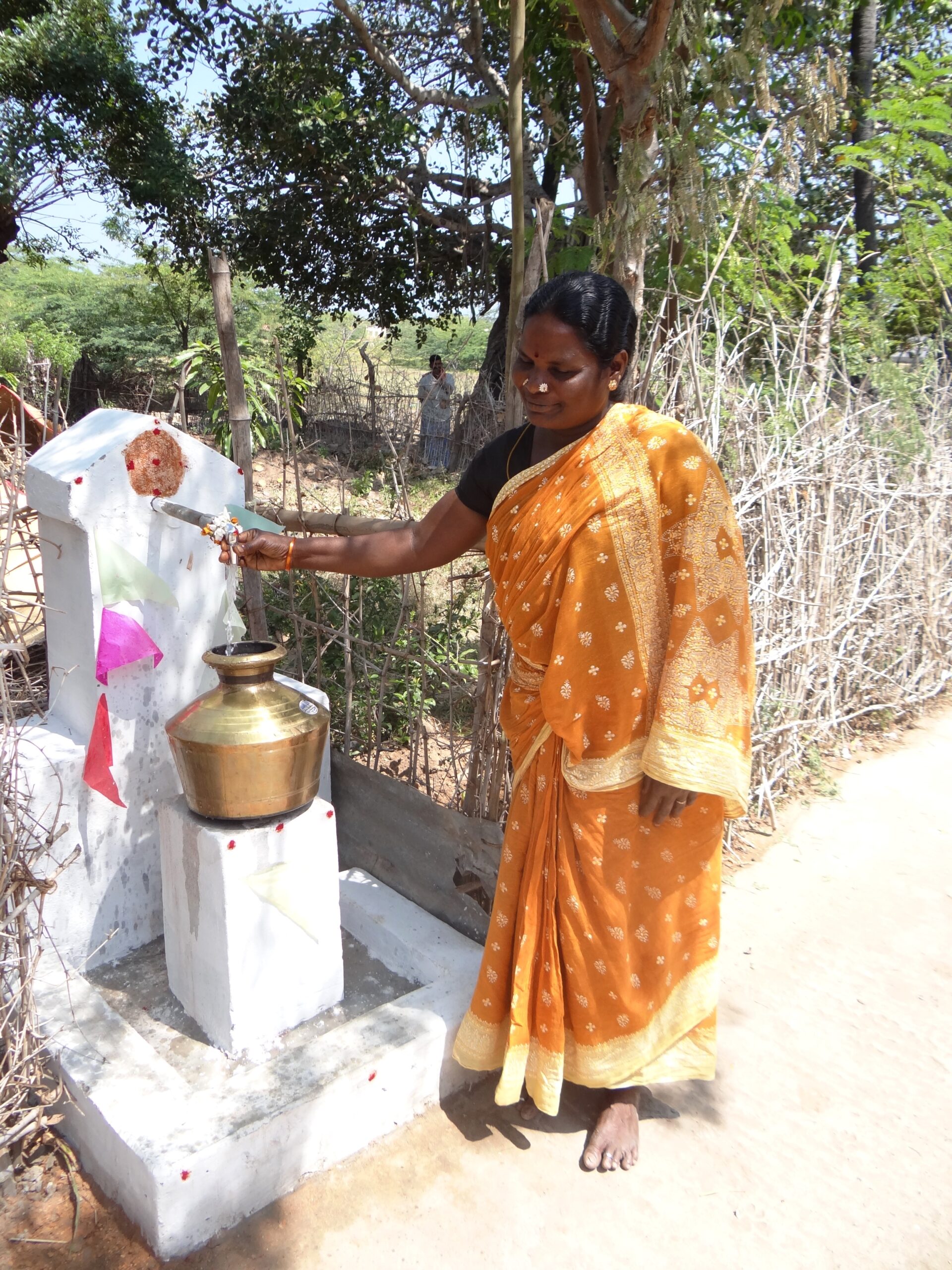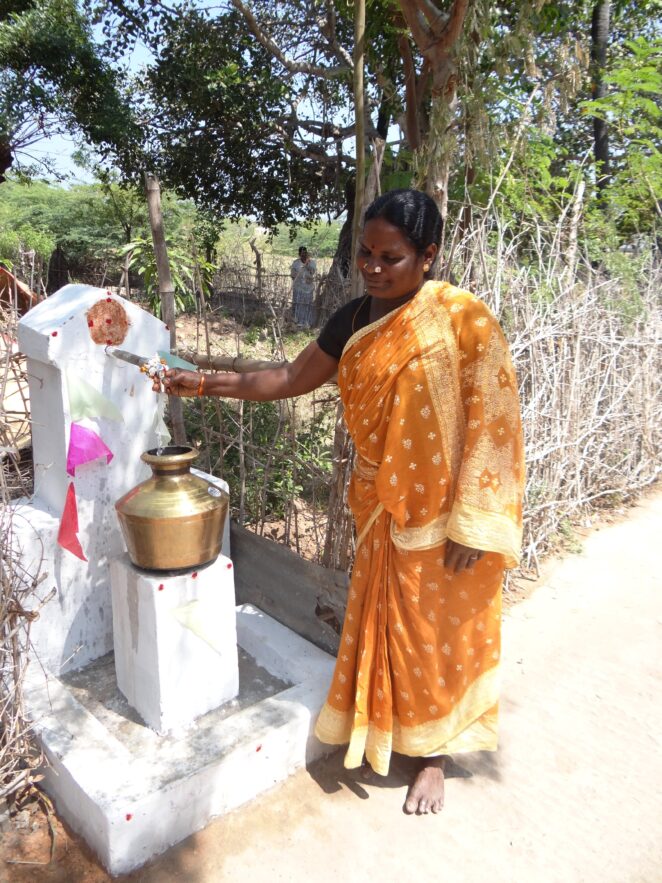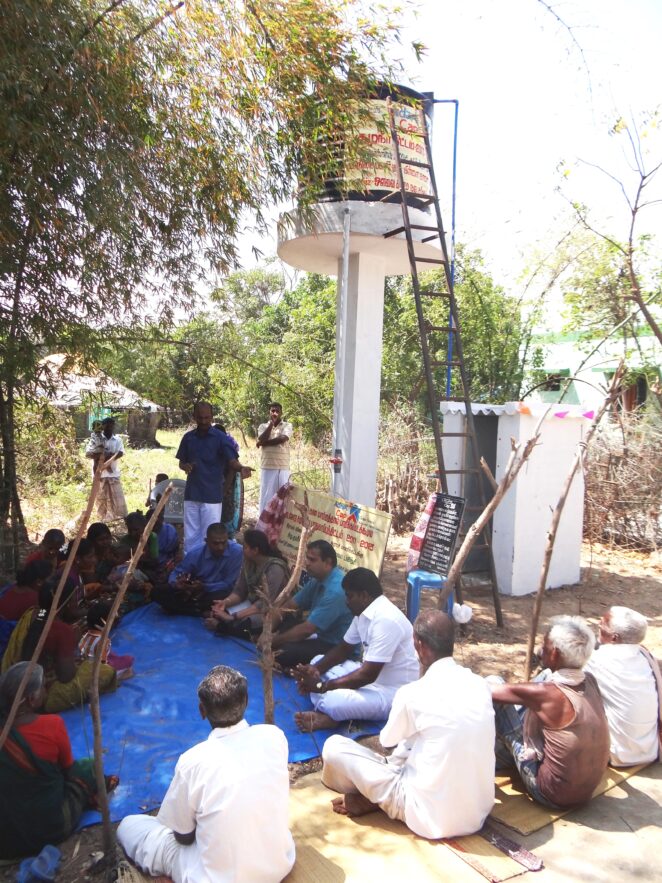Drinking water system repair and training – Improving the water supply in the village of Pillai Colony, India


Pillai Colony’s new water taps
Pillai Colony, a coastal village of 160 inhabitants located on the shore of the Bay of Bengal in Tamil Nadu, has been facing severe water scarcity in recent years due to water source salinisation, where hanging water consumption habits added to the water stress. The villagers depended on external piped water, but only a limited amount of water was piped to the village; in the dry season the village tank was in fact only filled every 4 days. With climate change the water stress is expected to further increase: Shorter but heavier rainfall periods will further reduce rain water catchment and ground water replenishment, while water demand increases with rising temperatures and longer drought periods in the region. Women were already forced to walk many kilometers every day with heavy water pots to fetch water from other villages.
Supported by the EU-financed project “AdaptCap”, the community in cooperation with the Panchayat decided to renovate the existing water supply and drainage system within the village and introduce a drinking water management programme. At first, the overhead tank for storing water was to be re-used. However, as there was no pipeline for more than 6 km between the nearest pumping station and Pillai Colony and the village was at the end of the line, the pressure to pump water was insufficient. To ensure a clean, reliable water supply, a regional booster pump station with a mini overhead tank was constructed and the village’s already existing pipeline infrastructure renovated. Renovation works included checking, repairing and replacing existing water pipes, taps and tank bases as well as re-designing parts of the system. A training programme on water management improved the community members’ ability to use their water sources more efficiently. This combination of measures ensures that sufficient drinking water is available to the community. On a daily basis up to 40 litres of fresh water are now supplied per person via 8 water supply points distributed throughout the community. This helps prevent water borne diseases and saves the women time necessary for fetching water. Key benefits of this adaptation measure are:
- Amount of drinking water assured for inhabitants: 730 m³ clean drinking water available per year (i.e., 200l per day )
- Improved capacities in water management: 28 villagers – of them 12 women – were trained in water management issues
Implementation costs
The overall costs of this adaptation measure – including a local vulnerability and needs assessment, capacity building measures in the community, technical support as well as material and labour costs – amounted to Rs. 371,000. Of these, Rs. 344,000 were borne by AdaptCap while the community contributed Rs. 27,000.
Operation & maintenance of the system
In order to remain operative in the long run, several parts of the system require regular operation and maintenance (O&M). Regular O&M activities include:
- Verifying quality of water through regular testing
- Verifying water system is intact and none of the parts are damaged
- Implementing repair works and renovation of water system regularly
- Ensuring all community members are aware of proper usage and maintenance of water system
The Panchayat and the Women SHG have jointly taken on the responsibilities of operating and maintaining the water distribution system. The Panchayat pays the electricity charges, while the Women SHG meets the expenses of repair and renovating works from the user fees as well as the monthly interest of a joint fund. The average monthly O&M costs amount to Rs. 3,460. Each member of the community contributes Rs. 50 per month to be able to consume water. An additional Rs. 750 are taken from the monthly interest of a joint fund.
M&E of activities and benefits
A monitoring and evaluation (M&E) system was developed to regularly screen and assess the adaptation project’s sustainability and impact. Information is collected in four areas:
- Effectively achieved vulnerability reduction
- Acceptance by and technical feasibility for the community
- Cost for implementation and regular O&M
- Positive and negative side effects (i.e., environmental, social, economic)
Challenges and lessons learnt
- Strong buy-in by the community and local authorities are the key to an efficient and sustainable implementation.
- When planning the renovation of a water supply system, the pressure of supplied water needs to be controlled first. Pumping into an overhead tank requires sufficient pressure; in case the pressure is too low a different solution might have to be found.
- Renovation and repair works to water supply and drainage system should be done outside the rainy season as heavy rain events damages construction works and delays finishing them. The time schedule needs to be designed keeping this in mind.

Pillai Colony community introducing the new overhead water tank
Project background and partners
The project “AdaptCap – Strengthening Adaptation Capacities and Minimizing Risks of Vulnerable Coastal Communities in India” financed by the European Commission has set out to strengthen the adaptation capacities of vulnerable coastal communities in Andhra Pradesh and Tamil Nadu (India) and minimize their climate change-related risks using an integrated approach.
The three-year initiative is implemented by the Indo-German Environment Partnership Programme of Deutsche Gesellschaft für Internationale Zusammenarbeit (GIZ-IGEP) in partnership with four Indian and international partners.
GIZ-IGEP is responsible for the overall implementation and project management.
AVVAI Village Welfare Society (AVVAI) supports the stakeholders in three cities and nine villages in Tamil Nadu as a local partner, providing training and implementation support in assessing adaptation needs and developing and carrying out adaptation measures.
Academy of Gandhian Studies (AGS) fulfills the same role in Andhra Pradesh.
adelphi contributed to developing technology solutions for the pilot projects and M&E frameworks, designing and implementing capacity building programmes and providing technical support for pilot project implementation.
ICLEI South Asia led the implementation of activities in the six urban areas targeted by AdaptCap.
(0) Comments
There is no content